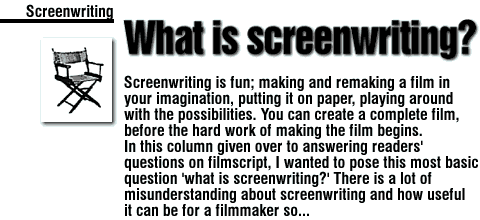
Q. Why should I write
a script? I know my film, I have found my locations, I have got my shooting
notes and dialogue for the actors.
A. How much have
you set aside to make your short film? £5,000, £10,000, £15,000,
more? And you want to risk all this without knowing exactly what your film is.
What holds it together, if it’s really good? When you write a script, you
can try it out on an audience [readers, actors, friends]. Get honest feedback.
You can play around with different versions of your film [with the actors or
just on paper] - all it costs is ink and imagination. lf you’ve got a strong
idea and a coherent film narrative, it will be clear in the script. lf you haven’t,
why make a film to find out?
And don’t think script only works for conventionai stories. If you write to a correct format then you can visualize any kind of film. Let’s face it, the fact is that most short films are poor. Sit through any open access festival and you’ll agree. Either the filmmakers never had scripts or only mums and lovers read them.
And don’t worry about a script restricting your creativity, the script is not a blueprint for shooting. A good script doesn’t constrain the director it excites him. Though hasty changes of whole scenes during production can unbalance your film. If you have to do this, rewrite them first and read them before reshooting.
Q. What is screenwriting?
And what use is it?
A. Put simply, it is creating a written text which visualizes a film for a reader.
The writer or auteur is the first reader. The text may be any one of a number
- typically, an outline, a treatment or a script. It can be fiction, faction,
documentary - anything a film can be.
An outline is a page or two that expresses the film’s concept. A treatment [now almost any length] shows how the film develops from the beginning to end. Both are a great way to store future film stories. And you can sell them. More often you use them to get development money or to get people on board your production. By rewriting and expanding them yourself, they become steps to move to a coherent full script. Remember, sooner or later you will have others working from a script, so you will need a clear script.
Of course to visualize a film, a reader must understand the written text. This depends on how good the writer’s technique is, it also depends on whether the reader understands filmscript in the first place. Most people think they do, just as they believe they could easily write a great script or make a great film. We’ve all been brought up watching films and TV so we think it is easy. Why are there so many poor scripts around then and poor first time films?
Watching is not seeing - seeing how the film is actually put together. How many challenging films do most of us watch? - films which force us to see how film works?...
PauI Gallagher
PauI Gallagher is a writer and Director of Euroscript, a MEDIA script development
project, and lecturer in media practice on BA Humanities, London University.
Full article published in Filmwaves - Issue 4, Spring 1998. Subscribe now!